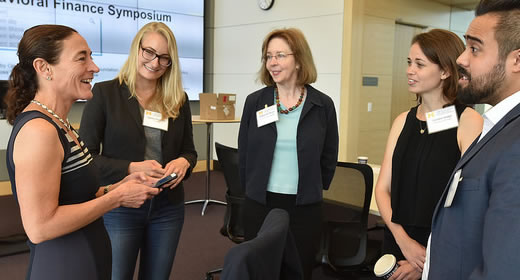
On September 14-15, 2017, the University of Michigan’s Center on Finance, Law, and Policy and behavioral science research and design lab ideas42 brought together influential leaders from academia, government, nonprofits and the financial sector for a two-day symposium on behavioral finance. Behavioral finance is the study of how behavioral biases and tendencies affect financial decisions, and in turn how those impact financial markets.
Nobel laureate, Yale University economics professor, and “father” of behavioral finance Dr. Robert Shiller and J.P. Morgan Chase Institute CEO and former White House advisor Diana Farrell served as the Symposium’s keynote speakers. They joined 16 experts from a variety of backgrounds to discuss behaviorally influenced research and innovations in financial products and services, and the impact of these innovations on the entire financial system. Speakers included representatives from financial sector regulators (in the U.S. and abroad), non-governmental organizations committed to bolstering financial inclusion and health, private-sector financial services providers, and academic researchers. Panels covered macroeconomic issues, market stability, microenterprises and small businesses, and investor and consumer protection.
The CFLP has now published a paper that summarizes the dialogue from the symposium. [Download the full paper here]
The paper is divided into two parts. Part I defines behavioral finance, explores how behaviorally minded economists and others seek to depart from assumptions that have traditionally played an important role in modeling human behavior, and discusses the underlying policy debate surrounding the use of “nudges.” Part II builds upon this understanding by analyzing: consumers’ and small businesses’ financial well-being; the innovative “nudges” and experiments undertaken by symposium speakers and the organizations they represent; the limits, unintended consequences, and externalities that have arisen from innovation in behavioral finance; and the ways in which these small nudges have ripple effects throughout the entire financial system, affecting macroeconomic financial stability.
Full videos of the two keynote addresses and four panel presentations are available at financelawpolicy.umich.edu/behavioral-finance-symposium.
In welcoming attendees, University of Michigan Ross School of Business Dean Scott DeRue praised the interdisciplinary nature of behavioral finance across all fields and dimensions as part of the larger goal of increasing social impact. Shiller discussed his research on how peoples’ narratives of the economy—shaped by individual experiences and stories—collectively affect financial markets. Farrell discussed how the JPMorgan Chase Institute uses big data to develop financial models for household and small businesses that align more closely to individual behavior, and encouraged practitioners to use those findings to design policies and products that improve financial stability. University of Michigan’s Gerald R. Ford School of Public Policy Dean Michael Barr discussed how policy designers could incorporate those and other findings to drive healthier decision-making.
The following themes emerged from the keynote presentations, four panels, Q&As, and discussions throughout the Symposium:
- People are fallible: Ideally, people would have infinite time, attention and the necessary self-control to make the best financial decision possible—but they do not. People are subject to contexts and biases that cause them to make mistakes. Policy practitioners should consider equity impacts of these influences: for some, not being able to make the right financial choice means paying a small fee or penalty; for others, it means taking a catastrophic hit to their financial well-being. Farrell showed how an adjustable-rate mortgage can upend household spending patterns, often to the detriment of their financial health.
- Irrationality abounds in markets too: Behavioral biases reverberate beyond individual decision-making into the global economy. Shiller explained how heterogeneous perceptions drive decisions, which causes “rational” markets to under or overvalue products. Law Professor Claire Hill made the case for redesigning banker compensation to align incentives better in the private sector.
- Context matters: It is not enough to know people have certain biases—the magnitude and direction of those biases can differ across different kinds of customers and businesses, depending on the context. What works for one group may not work for another. JP Morgan Chase Institute segmented small businesses by industry, and was able to highlight different financial needs within each group. Professor James Choi presented on how peer comparisons in retirement savings negatively influenced one group, while positively impacted another. Mary Ellen Iskenderian discussed how Women’s World Banking is helping financial service providers augment their products and services to reach unbanked and underbanked women.
- Test, Retest and Test Again: Behavioral economics is not an exact science; unintended consequences abound. Phyllis Borzi, a former Assistant Secretary at the U.S. Department of Labor, discussed the downsides to disclosure, including how it may foster a false feeling of trust. Jeroen Nieboer from the UK’s Financial Conduct Authority illustrated how a modification to investment advisors’ fee mechanisms led to an advice gap in the industry.
Unbeknownst to the attendees, the symposium also included three live audience experiments designed by ideas42 to test some of the most well-known psychological biases documented in behavioral economics. Would an audience learning about inattentiveness still find themselves subject to bias? (Spoiler: overwhelmingly, the answer was yes.)
The organizers thank the Alfred P. Sloan Foundation and Omidyar Network for making this event possible, along with co-sponsors the University of Michigan Law School, the University of Michigan’s Ross School of Business, and the University of Michigan’s Ford School of Public Policy. The Center on Finance, Law, and Policy also gratefully acknowledges the support of Paul Lee, John Lummis, and Bill Marcoux.
More news from the Ford School
